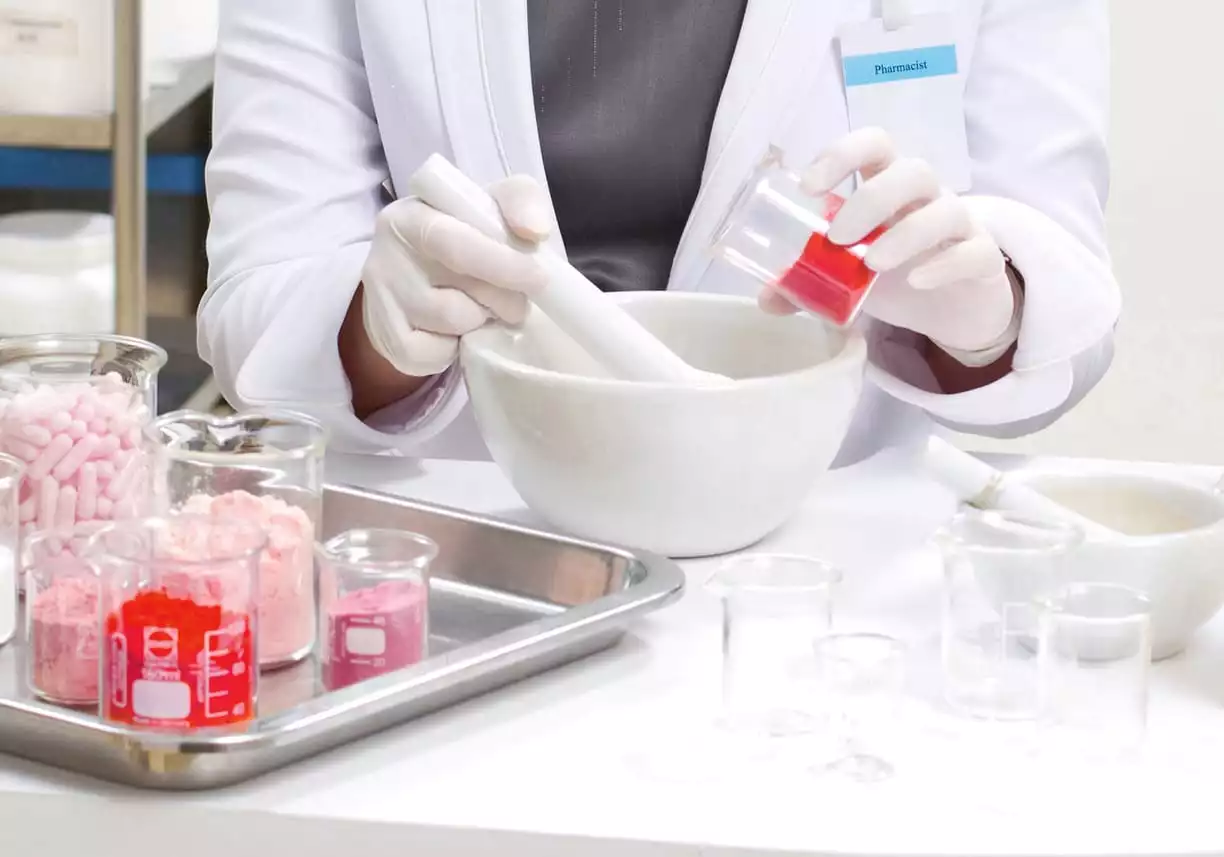
Compounding medication is a valuable option for many individuals who are in need of custom medication or dosage methods; but what does it mean to compound medicine?
Many people’s first exposure to a compounding pharmacy is when they suddenly have a need that mass produced medication cannot meet. Alternatively, you might have just been passing by your local pharmacy and wondered what it means when they say they offer compounding.
While it is common to be unaware of the benefits of compounding medication, it’s important to know that the concept is not new. In fact, pharmacists have been compounding since the earliest days of medicine. Finding out more about what it involves will help you find better solutions for common medication problems.
What Is Compounding Medication?
Compounding medication occurs when a pharmacist uses their expertise to prepare a medication or delivery system that is tailored to fit a person’s specific needs. There are many reasons why a medication may need compounding. For example, your pharmacist may compound your medication if you have an intolerance to a specific ingredient. Or they may compound a medication that has been discontinued by a major manufacturer.
How Is This Different From Manufacturing?
Major drug companies mass manufacture medications before sending them out to their markets. While this method does help people get access to common drugs quickly, the one-size-fits-all approach doesn’t work for everyone. Pharmacists carefully prepare compounding medication in a pharmacy according to your needs. For instance, you may need a certain medication adjusted to decrease or increase the strength. A compounding pharmacist can customize it based upon your personal characteristics.
What Kind of Training Does a Compounding Pharmacist Need?
Pharmacists must complete strict educational and training requirements before they can practice compounding medication in a pharmacy. After graduating from their pharmacy school program, they may also have to pass exams. These test their skills before they can obtain their license. Continuing education courses are also an essential part of their work. They maintain their knowledge of new innovations occurring in the field of medicine.
Can Pharmacists Compound Medicine For Kids?
Pediatric compounding can be done, and has many benefits. Parents of children who cannot tolerate medications often visit compounding pharmacists. This is because many medications can be compounded specifically for kids to change the flavor or remove ingredients such as gluten that irritate their allergies. It is also possible to compound medication to alter how individuals consume it. Being able to rub on a topical ointment is often easier than a needle for kids who need pain medication.
What Else Can a Compounding Pharmacist Do?
A compounding pharmacist would never claim to be a magician. This is because they focus on the science behind what they do. However, many people are not aware of just how popular compounding is for everyday things.
- For example, cosmeceuticals are prepared by compounding pharmacists, and this simply involves blending pharmaceutical grade ingredients into your every day beauty products.
- You could have an acne medication compounded into your daily moisturizer to enhance the effects of your skin care routine.
- Bioidentical hormone replacement therapy is also an option that can help you treat the symptoms of aging such as menopause with individualized creams.
1. Adjust Medication Strengths
One of the most common reasons for compounding medication is a need for a specific strength that is not commercially available. This is common when a person has unique needs. For example, a child who requires pain medication that is usually for adults. Alternatively, you may need to adjust the strength of your medication to make it more effective or to minimize unwanted side effects that come with larger doses. A compounding pharmacist is the one who does this for you.
2. Enjoy Palatable Flavor Options
There’s a reason why people always say that a spoonful of sugar makes the medicine go down. There are some medications that are simply so awful that it requires some expert adjustments. It is also common for parents to find that getting their child to take a strong-tasting antibiotic is impossible without the help of a compounding pharmacist who can add in a more palatable flavor. It seems so simple, yet adding a burst of cherry or cotton candy flavor makes it easier to take medication. Besides, even adults can enjoy turning a mundane event such as taking their medication into a flavorful experience.
3. Choose a Better Delivery Method
Pills or injections are not always the preferred delivery method for medication, and it is common for some people to skip their dosages due to fear of needles or choking on a pill. This is another issue that commonly occurs with children or seniors. Health conditions such as anxiety, vomiting and diarrhea can also change how you need to have your medication delivered. When compounding medication, you can choose to have it prepared as you wish. It can be a flavored liquid suspension or a topical gel that is rubbed onto the skin. Suppositories and sublingual troches are additional options for delivery that your pharmacist might suggest depending upon your specific needs.
4. Remove Unwanted Filler Ingredients
Many commercially prepared medications come with filler ingredients such as red dye or gluten that may cause adverse side effects in sensitive individuals. Fortunately, you do not have to give up on treating your health condition because of an allergy. Simply let your compounding pharmacist know about your allergies. From there, they can mix you up a medication that is free of lactose, preservatives or any other filler that triggers your symptoms.
Customizing your medication is the ideal way to ensure that it fits all of your needs, and compounding medication goes way back to the earliest days of pharmacies. You now have the option to choose how to prepare and deliver your medication. This opens up new ways to treat your health conditions on your terms so that your body can heal.
Hearing about compounding medication for the first time is enough to pique your curiosity. Now, you can explore the potential that taking control over your medication can have for your health and well-being. Whether you have been searching high and low for a hard-to-get medication or just need a solution to stop your child’s gagging when you give them their nightly pill, stepping into a compounding pharmacy is the ideal way to finally find an answer to your needs.

 info@burtsrx.com
info@burtsrx.com


It’s good to know that compounding prescriptions occurs when pharmacists use their expertise to prepare a medication or delivery system that is tailored to fit a person’s specific needs. My daughter is interested in becoming a pharmacist, but she doesn’t know much about the field. I’ll pass this information about compound prescriptions along to her so that she knows a little more.
It’s great that you mentioned that a compounding pharmacist could produce better tasting antibiotics for children so they would take it. My sister is having a hard time making her daughter take her medications. I’ll call her later to suggest she visits a compounding pharmacy. Thanks!
Yes! Compounding can be an amazing tool when it comes to children’s medication! Thank you!